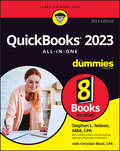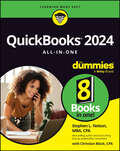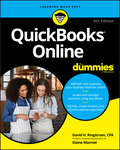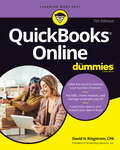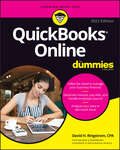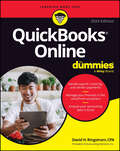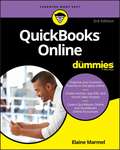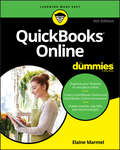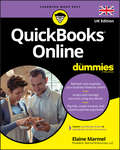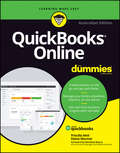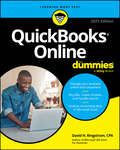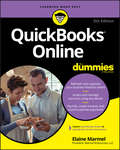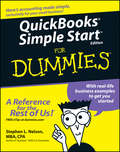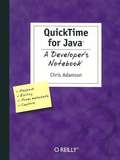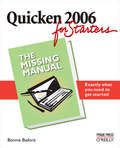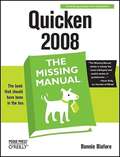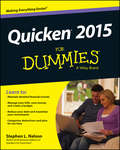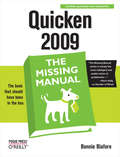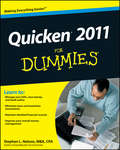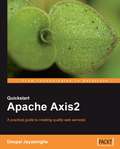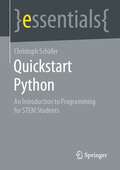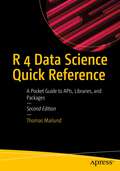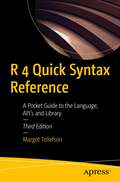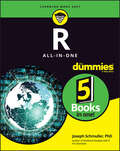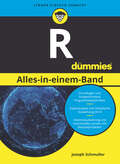- Table View
- List View
QuickBooks 2023 All-in-One For Dummies
by Stephen L. NelsonThe quickest way to learn everything there is to know about QuickBooks QuickBooks is the leading small business accounting software, designed to help you handle your financial and business tasks more effectively. QuickBooks 2023 All-in-One For Dummies answers all your QuickBooks questions, with 8 content-rich mini books in one complete package. You can get the most out of the latest QuickBooks release, thanks to this go-to reference covering account setup, double entry bookkeeping, invoicing customers, paying vendors, tracking inventory, creating a business plan, cloud storage, and everything else QuickBooks can do for you. Plus, you can access your information from any device with new online features, making it easy to manage your business on the go. Dummies walks you through everything, step by step. Set up QuickBooks for your small business and import all your accounts and data Manage invoices, payments, and inventory—and see it all on quick statements and reports Make the most of the latest version of QuickBooks with this updated guide Use economic value-added analysis and other analysis tools to identify potential savings and profit opportunitiesSmall business owners, managers, and employees who use QuickBooks already or want to switch to the leading software package will find everything they need in QuickBooks 2023 All-in-One For Dummies.
QuickBooks 2024 All-in-One For Dummies
by Stephen L. NelsonThe quick way to get started—and get proficient—with QuickBooks QuickBooks 2024 All-in-One For Dummies is the solution small business owners and managers are seeking. This high-value reference combines 8 content-rich mini-books into one complete package, providing the answers you need to get the most out of the 2024 version of QuickBooks. You’ll learn the key features of QuickBooks and small business accounting, including setting up the software, understanding double-entry bookkeeping, invoicing customers, paying vendors, tracking inventory, creating reports, and beyond. Plus, you’ll discover how you can use cloud storage to access your information on your smartphone, making running a small business that much more manageable. Sign up for QuickBooks software, set up your accounts, and customize your preferences Learn the basics of accounting and bookkeeping, and make sure you’re doing it right Discover advanced features of QuickBooks that will help you run your business smoothly and efficiently Save money by confidently managing your finances yourself This beginner-friendly Dummies guide makes it a breeze for small business owners, managers, and employees to implement QuickBooks at work.
QuickBooks Online For Dummies
by Elaine Marmel David H. RingstromMaster the world’s most popular cloud software for bookkeeping and accounting. QuickBooks Online For Dummies, 6th Edition collects and provides the best and most current information available for those looking to get the most out of the leading QuickBooks Online software. Perfect for small business owners, managers, and employees, QuickBooks Online For Dummies delivers the newest and most up-to-date advice based on the latest versions of QuickBooks Online. The 6th Edition is written by a seasoned author of more than seventy books. Whether you’re a QuickBooks Online newbie or seasoned pro, you’ll find actionable and accessible advice in this new edition. Get tips on: · Creating invoices and credit memos · Recording sales receipts · Recording and paying bills · Setting up inventory items · Tracking business checkbook and credit cards · And more No longer will you have to struggle through your interactions with the most used bookkeeping and accounting software in the world. Master this technology with the straightforward and accessible approach made famous by the For Dummies series.
QuickBooks Online For Dummies
by David H. RingstromGet a handle on the world’s most popular cloud bookkeeping and accounting app QuickBooks Online comes second-to-none in providing simple and powerful bookkeeping and accounting features that can streamline your business, make you more profitable, and organize your company’s finances. But if you’re not quite sure how to make it all work, or if you just want to get a grip on its newest features, QuickBooks Online For Dummies is the companion you need to make the most of your favorite cloud accounting software. This book walks you through each and every step of creating an invoice or credit memo, recording a sale, paying bills, setting up and managing your inventory, and tracking your business checkbook and credit cards. It also includes: New updates on exporting data to Microsoft Excel or Google Sheets so that you can analyze your business data new ways. Stepwise walkthroughs of how to install and set up a new instance of QuickBooks Online for your business or personal accounts. Exclusive tips for bookkeepers and accountants working with clients in QuickBooks Online, including new techniques for automating monthly reports that you create in Excel from data that you export from QuickBooks. Whether you’re a small business owner, an accountant, a bookkeeper, or just someone trying to help their boss keep up with their accounting records, QuickBooks Online For Dummies is the resource you need to make the most popular cloud bookkeeping and accounting software in the world work for you!
QuickBooks Online For Dummies
by David H. RingstromYour one-stop guide to taking your books into the cloud QuickBooks Online For Dummies is the go-to for cloud-based small business accounting. Online accounting could be saving you time and money. Newcomers to QuickBooks Online will love this updated edition of the classic guide to making the most of mobile accounting, while accountants will appreciate the practice management features in QuickBooks Online Accountant. Dummies makes it easy to learn the program&’s key features, including getting started, creating invoices and credit memos, recording sales receipts, recording and paying bills, setting up inventory items, tracking business accounts and credit cards, printing checks, processing payroll and preparing payroll tax returns, building a budget, reconciling bank accounts, generating financial reports, job estimating, billing, and tracking, backing up your data, simplifying tax preparation, and beyond. Phew! Subscribe to QuickBooks online and enjoy the enhanced security and features of cloud-based accounting Learn all the ins and outs of the popular accounting software and transfer your data from QuickBooks Desktop or from spreadsheets like Microsoft Excel or Google Docs Keep solid records, prepare accurate reports, and budget to identify cost savings Access your accounting information from anywhere, on any device Analyze your accounting reports in Microsoft Excel with PivotTables and Power Query Manage your accounting or bookkeeping practice with ease with the free QuickBooks Online Accountant versionThis book is perfect for small business owners, managers, and employees who utilize QuickBooks Online and would like more fluid access to their business accounting. Bookkeepers and accountants would appreciate this quintessential resource as well.
QuickBooks Online For Dummies
by David H. RingstromLearn the world’s most popular cloud accounting platform QuickBooks Online For Dummies, 2024 Edition, helps you benefit from fast and easy mobile accounting. This beginner-friendly guide covers the key features of QuickBooks Online, including selecting the subscription version that’s right for you and your business -- Simple Start, Plus, or Advanced. From there, you’ll find everything you need to get started creating invoices and credit memos, recording and paying bills, setting up inventory items, processing payroll and preparing payroll tax returns, balancing accounts, and beyond. You’ll discover how to access your accounts from any device, anywhere—and how to keep your data safe and backed up. For a world on the go, QuickBooks Online makes it easy to keep solid books and be prepared at tax time. With the clear how-tos in this book, you’ll be up and running in no time. Get started with QuickBooks Online and set up your accounts Manage customers, inventory, purchases, payroll, and billing—from anywhere Generate financial reports and simplify your taxes Discover new features and tips in the latest version of the cloud softwareFor small business owners, managers, and employees responsible for business accounting, QuickBooks Online For Dummies helps you make the most of the go-to platform for fluid accounting access.
QuickBooks Online For Dummies
by Elaine MarmelThe fast and easy way to manage the books with QuickBooks OnlineSearching for a cloud-based accounting solution for your small business? Use this guide to master the fundamentals of QuickBooks Online--the world's most popular software for fast and easy mobile accounting! Inside, you'll find hands-on, practical guidance for using QuickBooks Online to build the perfect budget, process payroll, simplify tax return preparation, create invoices and credit memos, and manage inventory. Plus you'll discover how to track job costs, generate income statements and financial reports, and balance accounts--all with quick and easy access to this cloud-based software. All you'll need is an Internet connection!QuickBooks allows small businesses to manage their own accounting and financial tasks without having to hire expensive financial professionals. Now, QuickBooks Online brings all of the software's convenient tools to your browser, which you can use at any time and from any device. QuickBooks Online For Dummies takes the intimidation out of this new technology and shows you how to make it work--painlessly and productively--for you and your small business. It doesn't get easier than that!Find out how to organize your finances in one placeCreate invoices, record sales receipts, and pay your billsTrack inventory, figure job costs, and create reports to monitor your businessUse QuickBooks Online to take the stress out of tax seasonThis book covers QuickBooks Online and QuickBooks Online AccountantIf you're a small business owner, manager, or employee looking for a fast, affordable, convenient way to manage your company's finances, QuickBooks Online For Dummies has everything you need to get up and running fast.
QuickBooks Online For Dummies
by Elaine MarmelGet your QuickBooks in the Cloud! Searching for a cloud-based solution for your small business? Master the fundamentals of QuickBooks Online, the world's most popular software for fast and easy mobile accounting! QuickBooks Online For Dummies teaches about building the perfect budget, processing payroll, simplifying tax return preparation, creating invoices and credit memos, managing inventory, sharing your data with your accountant, generating income statements and financial reports, and balancing accounts—all with quick and easy access to this cloud-based software through an internet connection. QuickBooks Online brings this software to your browser for a monthly fee, allowing you access to its tools from any device with an internet connection. For the money, it provides a good value and a reasonable assortment of features to meet the needs of small business owners looking to make their accounting tasks easier and more manageable. And now you too can benefit from all it has to offer! Deal with billing and payroll Track expenses and sales Enjoy automatic data backup Seamlessly integrate with third-party apps It's never been easier to run your business from the cloud with QuickBooks accounting software. Your data automatically syncs across your devices so you can work from your car, office, or kitchen table!
QuickBooks Online For Dummies Australian Edition
by Elaine Marmel Priscilla MeliOrganise business finances with the latest cloud-based accounting innovation QuickBooks Online For Dummies, Australian Edition is your key guide to getting business finances under control. From budgeting and payroll to tax, inventory, accounts and beyond, this book shows you everything you need to know to keep the cash flow flowing. Whether you're a small business owner, accountant or bookkeeper, this guide walks you through essential bookkeeping tasks, and hands-on tutorials provide quick and practical instruction using the QuickBooks Online and QuickBooks Online Accountant cloud-based accounting solution. Stop juggling files and notes and calendars, stressing about what's due, what's coming and what you may have overlooked; this book shows you how to track and manage everything in one place, with alerts, reminders and detailed reports that help you gain a clearer picture of the business's financial state -- and all you need is an internet connection. Using the many helpful, timesaving features of QuickBooks Online and QuickBooks Online Accountant to their utmost capability requires a little insider knowledge and hands-on instruction; this book has you covered, with clear, practical guidance to help you: Manage payroll, invoices and accounts payable Track inventory, costs and expenses Create reports and simplify tax return preparation Organise finances in one intuitive place Wouldn't you enjoy the peace of mind that comes from knowing that your finances are under control? Wouldn't you prefer the freedom to access the books on any device, at any time? QuickBooks Online can help with that, and QuickBooks Online For Dummies, Australian Edition is the ultimate guide to working with the latest innovation in cloud-based accounting.
QuickBooks Online For Dummies, 2025 Edition
by David H. RingstromDiscover all the ways you can use cloud-based accounting for your business with this top guide QuickBooks Online For Dummies, 2025 Edition helps you understand one of the most widely-used cloud accounting platforms worldwide. Choose the best subscription for your business, create invoices and credit memos, record sales receipts, pay bills, set up inventory items, track business checkbook and credit cards, print checks, process payroll and prepare payroll tax returns, simplify tax preparation, build a budget, balance accounts, back up your data and access it on any device—the list goes on and this beginner-friendly book teaches you how to do it all. Chock full of useful tips and tricks, this golden guide makes small business accounting through QuickBooks Online a breeze—saving you time and money. Plus, this edition covers the latest features and shows you how QuickBooks uses AI to make accounting even easier for you and your needs. Subscribe to QuickBooks Online, import your business data, and utilize cloud-based accounting Get clear and visual instructions on how to perform basic and advanced accounting tasks Discover new features such as QuickBooks Ledger and find tools that suit business needs Analyze your accounting data to make better business decisions For business owners, managers, and employees, this essential Dummies resource helps you make the most of QuickBooks Online.
QuickBooks Online For Dummies.
by Elaine MarmelYour quick guide to using QuickBooks Online Searching for a cloud-based solution for your small business’ accounting needs? Master the fundamentals of QuickBooks Online—the world’s most popular software for fast and easy mobile accounting! QuickBooks Online brings this popular accounting software to your browser for a monthly fee, allowing you access to its tools from any device with an Internet connection. From generating financial reports to simplifying tax preparation to tracking business finances, QuickBooks Online For Dummies covers it all! Handle your financial and business management tasks more effectively Get the most out of QuickBooks’ features Create invoices and memos with ease Pay bills, prepare payroll, and record sales receipts If you use QuickBooks Online—or want to implement it—this new edition gets you up and running fast.
QuickBooks Simple Start For Dummies
by Stephen L. NelsonGet expert advice on daily, monthly, and yearly activitiesDefine your business, maintain records, manage sales tax, and produce reportsSo you've pulled off the corporate highway and started your own business? Good for you! Now you need a small business accountant, and guess what? With QuickBooks Simple Start and this handy guide, it just might be YOU! Find out how to set up an accounting system, prepare invoices, pay expenses, organize your tax stuff, and more.The Dummies Way* Explanations in plain English* "Get in, get out" information* Icons and other navigational aids* Tear-out cheat sheet* Top ten lists* A dash of humor and funDiscover how to:* Install Simple Start and understand its features* Create invoices and sales receipts* Save big on business taxes* Set up and reconcile bank accounts* Measure your profits
QuickTime for Java: A Developer's Notebook
by Chris AdamsonJava developers who need to add audio, video, or interactive media creation and playback to their applications find that QuickTime Java is a powerful toolkit, but one that's not easy to get into. This book offers the first real look at this important software with an informal, code-intensive style that lets impatient early adopters focus on learning by doing. You get just the functionality you need.
Quicken 2006 for Starters: The Missing Manual
by Bonnie BiaforeIntuit's Quicken is one of today's most popular and convenient ways to keep track of personal finances, and Quicken 2006 For Starters: The Missing Manual for Windows is the indispensable guide to using the program to simplify your finances and make the most of your money. Whether you're new to electronic banking or just new to Quicken, this refreshingly funny and sensible book zeroes in on exactly what you need to get into Quicken fast. It teaches you how do such essential things as: balance your checkbook on your computer, keep tabs on your spending, create and manage a budget, monitor and pay bills on time, determine more ways to save and stick to your savings plan, manage loans and maximize investments, make tax preparation easier (even find hidden tax deductions!), and much more. Financial-software writer and personal finance expert Bonnie Biafore delivers clear explanations and step-by-step instructions for the Quicken features you need, as well as relevant advice and plenty of real-world examples. Beginners will appreciate Biafore's clear guidance on how to set up Quicken to streamline their money management tasks. Power users will benefit from her insightful tips, tricks, and shortcuts for working around Quicken's idiosyncrasies and saving even more time and money. The book is designed to help you get up to speed fast. Biafore steps you through the basics of Quicken. Then, as you become a more efficient and sophisticated Quicken user, she helps you take advantage of the program's little-known but powerful features. And throughout the book, she offers invaluable money-management principles. You'll be generating useful reports and graphs with ease; ensuring accuracy and consistency among all your accounts; and planning, saving, and controlling your finances like never before. The book that gives you exactly what you need, Quicken 2006 For Starters: The Missing Manual helps you quickly make the most of Quicken 2006 for Windows.
Quicken 2008: The Missing Manual
by Bonnie BiaforeQuicken is one of the many convenient ways to keep track of personal finances, but many people are unaware of Quicken's power and end up using only the basic features. And sometimes Quicken seems to raise more questions than it answers: Return of capital from stock? "Net worth"? What are they and why do you need to know about them? Luckily, Quicken 2008: The Missing Manual picks up where Quicken's help resources leave off. You'll find step-by-step instructions for using Quicken on your Windows PC, including useful features such as budgeting, recording investment transactions, and archiving Quicken data files. You also learn why and when to use specific features, and which ones would be most useful in a given situation. Quicken 2008: The Missing Manual helps you: Set up Quicken to take care of your specific needs Follow your money from the moment you earn it Make deposits, pay for expenses, track the things you own and how much you owe Take care of financial tasks online, and quickly reconcile your accounts Create and use budgets and track your investments Generate reports to prepare your tax returns and evaluate your financial fitness And a lot more. This book is designed to accommodate readers at every technical level. If you're a first-time Quicken user, special boxes with the title "Up To Speed" provide the introductory information you need to understand the topic at hand. For advanced users, there are similar boxes called "Power Users' Clinic" that offer more technical tips, tricks, and shortcuts for the experienced Quicken fan. For a topic as important as your personal finances, why trust anything else?
Quicken 2009 For Dummies
by Stephen L. NelsonIf just thinking about financial management gives you a headache, personal finance software is better than aspirin. Quicken is tops, and Quicken 2009 For Dummies is the quickest and easiest way to put it to work.Here's the plain-English guide to using the newest update of the nation's leading personal finance software. A leading CPA shows you how to track your finances day to day, keep your checkbook and pay bills online, and even plan for tax time with Quicken. Learn as much or as little as you need to know -- just how to keep your checkbook straight, or even how Quicken helps manage stocks and the business end of rental property.Install and set up Quicken 2009, or update data files from a previous versionLearn to make a budget that's flexible enough to work for your family or your businessKeep your checkbook up to date, handle banking transactions online, and use Quicken calculatorsPrint Quicken reports to help you track cash flow, identify missing checks, summarize spending, and moreSet up tax-deferred or brokerage accounts and buy and sell securitiesTrack your credit cards and bank accounts as well as mortgages, loans, and other debtsUse Quicken's Home & Business or Rental Property Manager versions to keep your business booksHandle payroll for business or household employeesTrack deductions to make tax preparation easierWith Quicken 2009 For Dummies, you'll feel like a financial wizard!
Quicken 2009: The Missing Manual (Missing Manual)
by Bonnie BiaforeQuicken is a convenient way to keep track of personal finances, but many people are unaware of Quicken's power and end up using only the basic features. Sometimes Quicken raises more questions than it answers: Return of capital from stock? Net worth? What are they and why do you need to know about them? Luckily, Quicken 2009: The Missing Manual picks up where Quicken's help resources leave off. You'll find step-by-step instructions for using Quicken on your Windows PC, including useful features such as budgeting, recording investment transactions, and archiving Quicken data files. You also learn why and when to use specific features, and which ones would be most useful in a given situation. This book helps you:Set up Quicken to take care of your specific needs Follow your money from the moment you earn it Make deposits, pay for expenses, and track the things you own and how much you owe Take care of financial tasks online, and quickly reconcile your accounts Create and use budgets and track your investments Generate reports to prepare your tax returns and evaluate your financial fitness And a lot more. Quicken 2009: The Missing Manual accommodates readers at every technical level, whether you're a first-time or advanced Quicken user. For a topic as important as your personal finances, why trust anything else?
Quicken 2011 For Dummies
by Stephen L. NelsonThe classic guide to the leading personal finance software—completely updated! As the number one personal finance software on the market, Quicken empowers you to take control of your personal finances quickly and effortlessly. Providing you with a thorough update of all the latest features and enhancements to the new release of Quicken 2011, Stephen Nelson shows you how to track your day-to-day finances, better manage your investments, evaluate the tax implications of your financial decisions, and much more. Veteran author Stephen Nelson provides a thorough update to his classic bestseller on the number one personal financial management planning program Shows you how to track your day-to-day finances, better manage your investments, boost your personal savings, be more responsible with your spending, tackle debt, and more Presents a fun and friendly approach to a topic that many people find intimidating or overwhelming and quickly and easily helps you take control of your personal finances Whether you're a first-time Quicken customer or looking to take advantage of the updates the latest release has to offer, Quicken 2011 For Dummies offers a straightforward-but-fun approach to this popular personal finance software.
Quickstart Apache Axis2
by Deepal JayasingheThis is a step by step practical guide for developing web services using Apache Axis2. There are lot of real-life examples, which makes this book a good learning material. This book is for Java developers who are interested in building web services using Apache Axis2. The book presumes that you are familiar with web standards like SOAP, WSDL and XML parsing.
Quickstart Python: An Introduction to Programming for STEM Students (essentials)
by Christoph SchäferChristoph Schäfer introduces the great world of programming with Python and provides a quick introduction to independent script development. He points out how the programming language Python has established itself in recent years alongside MATLAB and R as a standard at scientific workplaces in research and development, and shows that the great popularity of Python is based on its easy extensibility: It is very easy to use modules from other developers in your own scripts and programs. In particular, the author presents the modules NumPy, SciPy and Matplotlib, which offer scientists and engineers a perfect development environment for scientific and technical computing, for applications in physics, chemistry, biology and computer science. Python is also used in the latest applications in the highly topical fields of Big Data Science and Machine Learning. The author: Dr. Christoph Schäfer teaches and researches in the Department of Computational Physics at the Institute of Astronomy and Astrophysics at the Eberhard Karls University of Tübingen. This Springer essential is a translation of the original German 1st edition essentials, Schnellstart Python by Christoph Schäfer, published by Springer Fachmedien Wiesbaden GmbH, part of Springer Nature in 2019. The translation was done with the help of artificial intelligence (machine translation by the service DeepL.com). A subsequent human revision was done primarily in terms of content, so that the book will read stylistically differently from a conventional translation. Springer Nature works continuously to further the development of tools for the production of books and on the related technologies to support the authors.
R 4 Data Science Quick Reference: A Pocket Guide to APIs, Libraries, and Packages
by Thomas MailundIn this handy, quick reference book you'll be introduced to several R data science packages, with examples of how to use each of them. All concepts will be covered concisely, with many illustrative examples using the following APIs: readr, dibble, forecasts, lubridate, stringr, tidyr, magnittr, dplyr, purrr, ggplot2, modelr, and more.With R 4 Data Science Quick Reference, you'll have the code, APIs, and insights to write data science-based applications in the R programming language. You'll also be able to carry out data analysis. All source code used in the book is freely available on GitHub.. What You'll LearnImplement applicable R 4 programming language specification featuresImport data with readrWork with categories using forcats, time and dates with lubridate, and strings with stringrFormat data using tidyr and then transform that data using magrittr and dplyrWrite functions with R for data science, data mining, and analytics-based applicationsVisualize data with ggplot2 and fit data to models using modelrWho This Book Is ForProgrammers new to R's data science, data mining, and analytics packages. Some prior coding experience with R in general is recommended.
R 4 Quick Syntax Reference: A Pocket Guide to the Language, API's and Library
by Margot TollefsonThis handy reference book detailing the intricacies of R covers version 4.x features, including numerous and significant changes to syntax, strings, reference counting, grid units, and more.Starting with the basic structure of R, the book takes you on a journey through the terminology used in R and the syntax required to make R work. You will find looking up the correct form for an expression quick and easy. Some of the new material includes information on RStudio, S4 syntax, working with character strings, and an example using the Twitter API.With a copy of the R 4 Quick Syntax Reference in hand, you will find that you are able to use the multitude of functions available in R and are even able to write your own functions to explore and analyze data.What You Will LearnDiscover the modes and classes of R objects and how to use themUse both packaged and user-created functions in R Import/export data and create new data objects in RCreate descriptive functions and manipulate objects in RTake advantage of flow control and conditional statementsWork with packages such as base, stats, and graphicsWho This Book Is ForThose with programming experience, either new to R, or those with at least some exposure to R but who are new to the latest version.
R All-in-One For Dummies
by Joseph SchmullerA deep dive into the programming language of choice for statistics and data With R All-in-One For Dummies, you get five mini-books in one, offering a complete and thorough resource on the R programming language and a road map for making sense of the sea of data we’re all swimming in. Maybe you’re pursuing a career in data science, maybe you’re looking to infuse a little statistics know-how into your existing career, or maybe you’re just R-curious. This book has your back. Along with providing an overview of coding in R and how to work with the language, this book delves into the types of projects and applications R programmers tend to tackle the most. You’ll find coverage of statistical analysis, machine learning, and data management with R. Grasp the basics of the R programming language and write your first lines of code Understand how R programmers use code to analyze data and perform statistical analysis Use R to create data visualizations and machine learning programs Work through sample projects to hone your R coding skill This is an excellent all-in-one resource for beginning coders who'd like to move into the data space by knowing more about R.
R Alles-in-einem-Band für Dummies (Für Dummies)
by Joseph SchmullerWenn Sie R von Grund auf kennenlernen und auch die fortgeschrittenen Techniken zur Lösung gängiger Aufgaben bei der Datenanalyse mit R beherrschen möchten, dann liegen Sie mit diesem Buch goldrichtig. Es bietet Ihnen nicht nur einen Überblick über die Programmierung in R und die Arbeit mit der Sprache, sondern geht auch auf die Arten von Projekten und Anwendungen ein, die R-Entwicklerinnen und -Entwickler häufig in Angriff nehmen müssen. Statistische Analysen, Datenvisualisierungen, maschinelles Lernen und Datenmanagement mit R: All das lernen Sie mit diesem Buch intensiv kennen.
